Social Justice & Community Change QUBES Faculty Mentoring Network 2021
Author(s): Tamara Basham1, Mary Mulcahy2, Denise Piechnik2, Pat Marsteller3
1. Collin County Commuity College District 2. University of Pittsburgh at Bradford 3. Emory University
1378 total view(s), 404 download(s)
Description
Building sustainable urban communities requires an understanding of the social and economic forces that shaped them and their modern environments. In this Faculty Mentoring Network, we will be using the historical practice of redlining to examine how social and economic factors over the last century have created disparities in environmental conditions in our urban communities that have significant implications for human health, biodiversity and evolution. We will use a combination of resources that have been gathered over this past fall 2020 as a jumping off point to develop course-based undergraduate research experiences (CUREs) that increase students’ understanding of Environmental Justice/ Social Justice issues using data-driven learning and authentic research experiences.
Notes
Corrected grammar in V1.0 abstract
Cite this work
Researchers should cite this work as follows:
- Tamara Basham, Mary Mulcahy, Denise Piechnik, Pat Marsteller (2020). Social Justice & Community Change QUBES Faculty Mentoring Network 2021. Cultivating Scientific Curiosity, (Version 2.0). QUBES Educational Resources. doi:10.25334/GBX8-HW05
